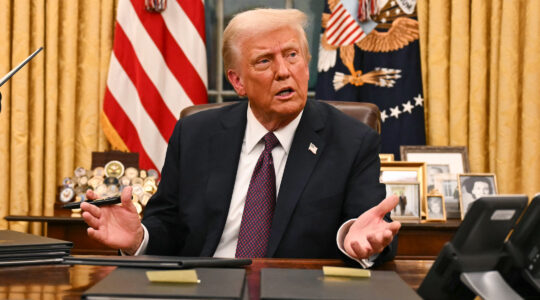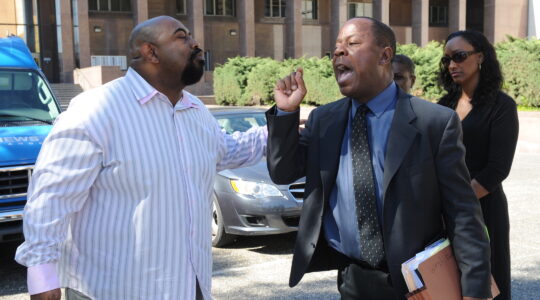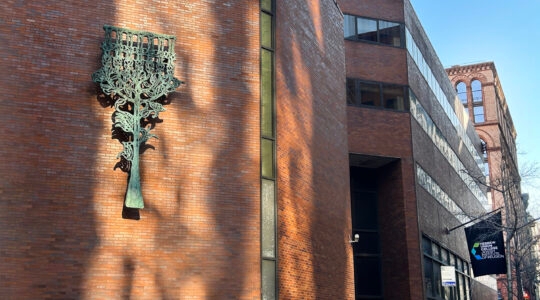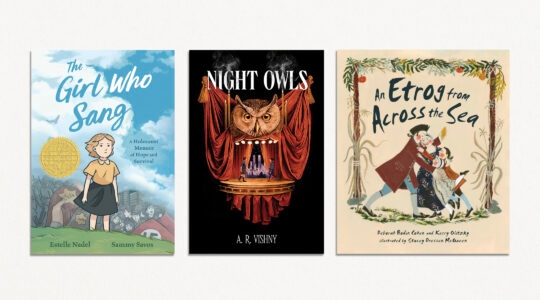
Emily Harrold (center) is turning her lens on the media who reported the news during the Holocaust.
The 21-year-old senior in the Tisch School of The Arts Film and Television Program at New York University is directing "Reporting on the Times," a look at how the New York Times covered the events of the Holocaust. [More on that topic from Northeastern professor of journalism, Laurel Leff, here.] The project received funding from the NYU Bronfman Center. Last month, Harrols and her team launched an online fundraising campaign to raise $6,000 by Mar. 2 and are currently shy of the halfway mark.
The Archive Blog’s Adam Soclof sat down with Harrold recently for a behind-the-scenes Q&A about the inspiration, main themes and goals of the film. Scroll down to the bottom to watch the trailer.
You mentioned you were interested in learning about American understanding of the Holocaust. How did that come about?
I took a class at NYU that was about other minorities that were persecuted in the Holocaust. Because I grew up in South Carolina, the Holocaust was always a Jewish thing. So to learn that there were so many other people that were targeted just opened my world.
Were you raised Jewish?
I’m not Jewish, so that’s the other part.
[[READMORE]]
From that class it was all these alternate understandings of history that you don’t really learn about when you’re skimming through a textbook or you’re taking American history. The professor also mentioned that the U.S. Government knew about the Holocaust in 1942, and that blew mind.
When you think about history, it’s always from the perspective of people who win the war, because those are the people who write the history books, usually. So we see history from the perspective of the great country of America in which they’re projecting themselves in the best way that they can. I guess learning that we weren’t the great liberators as much as we like to think of ourselves is sort of what got me interested in the topic.
Has your understanding of Jews in the Holocaust changed as a result of that class?
I definitely learned a lot in the class, but a lot of the stuff about the Jewish aspect of it I feel like I had a general understanding of. It was really when I started looking at how Jewish Americans reacted that that was really surprising. I don’t know if you read Haskell Lookstein’s dissertation.
I’m familiar with him, but I haven’t read his dissertation.
His big thing – and it makes sense especially when you think about it now – is that American Jews like any other part of the American society at the time were really involved in the things that were happening locally: so the fact that there was the depression, and it was really hard to get jobs, there was antisemitism that existed, and when the War started, everyone was fighting in the War. So that was the main concern, and the fact that something might be happening in Europe wasn’t on the forefront of their concerns. The way we understand what happened now, retrospectively, is just totally different, because we know the numbers and we’ve seen the pictures, and none of that was available at the time.
How did you choose film as a medium for this project?
I’m a filmmaker; I’ve always been interested in making historical documentaries, and this all came about in that way.
What was the first time you experimented with video or film as a medium?
The first time I decided to make a movie was in 8th grade. We had to do a project about the Odyssey and I thought we should make a movie about it, so I got half my class to come over to my house and we shot the Odyssey in a day. It was a lot of fun; I kind of watch it now as a joke.
What can you tell me about the process of approaching the [NYU] Bronfman Center for funding?
They have an emerging Jewish artist fellowship and I applied for that and got accepted. It meets every other Wednesday. We talk about what it means to be an artist and what our challenges are with our project …
One of the producers, Jake Holm, grew up in Manhattan. He’s one of the main producers who is Jewish; he’s been a vital part of helping me get to know people in the Jewish community.
So it was through him that you found out about the grant?
Yes.
Was it strange for you, applying for a fellowship that, uh –
– when I’m not Jewish?
– that calls itself the "emerging Jewish artist" fellowship?
[Laughs] Well, I asked first, “Can I even apply?” because I didn’t know if I was eligible. And [fellowship coordinator] Erica Frankel said yes. It’s different, because I think most people that are involved [in the fellowship] are Jewish, and you talk about how do you find your Judaism in your artwork. It doesn’t feel uncomfortable at any point, because a lot of stuff that you talk about is really relevant to anyone in any circumstances.
How did you go about assembling a team for this project?
It’s an NYU student film, and we are very lucky in that everyone is interested and working on everyone else’s projects; we have a very good community in that way. The first two people who became involved are two of my best friends, Jake and another girl named Lauren Franklin, they came on as producers, and then from there it sort of exploded. I didn’t realize it was going to be such a big project when we started, but now we have about 20 students working on it. I’m really excited because everyone else is really excited.
In terms of the research, is a lot of the content of the film — and the people you decided to interview — based on that class that you took? Who were you seeking advice from?
I did interview my professor, she was one of the first people I spoke with about it. And then Laurel [Leff] has been super helpful in terms of suggesting people and putting me in touch with people. And then basically reading books, figuring out who was the preeminent scholar on one subject or another. I interviewed Henry Finegold, who’s a big American Jewish studies historian, retired now, he was really great. I spoke with Hasia Diner, who’s at NYU, and she’s really good, too; Alex Jones, who wrote a book about the history of the NY Times.
I do want to say, there is this tendency for people to think that we’re blaming the NY Times, and that definitely isn’t the point of the film whatsoever. The thing that many people have reminded me of is that journalism is for the people and if the people don’t seem to be interested in the story, they’re not really going to write as much about it, especially at that time when Jewish causes were not a big thing for the U.S. I feel like people usually say, first you understand society, that’s really what we’re doing. We’re not trying to threaten the Times in any way, shape or form, because they were by far not the only newspaper to do this– most papers did the same thing.
Have you looked at any of the Jewish newspapers and how they covered this?
A little bit. I mean, Haskell Lookstein’s dissertation speaks a lot about this. My understanding is that the Jewish press did a little bit of a better job, but not that much. It was again, the local things that were going on — who was at war, who was dying and things like that. I know the JTA did publish a lot though.
Sure. We’re still figuring it out. I’m not a scholar in this but I do pore through there pretty regularly.
And it’s all relative, too. That’s the other thing: I don’t think there was really any newspaper that made it a headline consistently.
What other things have you learned about the Holocaust through newspapers and reporting at the time?
I can tell you with the NY Times, they published over a thousand articles. When you hear that number, that’s pretty impressive. They published consistently, it’s just the fact that it would never be in a way that would draw your attention to it, so it would be on page 7 or page 20.
I’m focusing on how they reported on the Warsaw ghetto, because it’s so much more manageable. And they published a little more than five stories. There’s this one story that’s about the liquidation of the Warsaw ghetto and it was published on July 29, 1942 on page 7, the very bottom of the newspaper, no headline. So unless you were actually reading every single word, on page 7 of this newspaper, you would have no idea that the mass liquidation of the Warsaw ghetto was taking place and that was such a big event for Warsaw, when that happened. So that’s incredible to me. But again, that ‘incredible-ness’ that we understand now is also retroactive.
Talk about the actual process of putting the film together. Where are you guys now? What has to be done in order for this film to be completed?
We’re sort of in a mad rush right now, because we have two months we want to finish a 40-minute version for the [The Academy of Motion Picture Arts and Sciences] Student Academy Awards, and that has to be finished by April, so it’s crazy. We are in a lot of different stages: I’m still planning on interviewing some more people, so production is still going, we’re still researching archival material, the editors have started editing. So it’s like we’re in all fronts all at once, but the ultimate goal is to have it done the first week of April.
And in order to get that done, how frequently — are you having team meetings?
I meet with people usually on an individual basis, because everyone’s doing something different. I see someone every day about the film. It’s kind of cool, because it sort of speaks to the digital era: we can have our digital office and never all be together in one room and we’re still accomplishing the same thing that a production office does.
In terms of funding, I saw that you guys have a Kickstarter campaign. How integral is that campaign to the production of the film itself?
Pretty integral.
Is it make-or-break?
We’re still going to make the film if we don’t get the funding, but archival material is just astronomically expensive. There’s this wonderful, wonderful clip of Arthur Hays Sulzberger, who was the publisher of the New York Times during WWII, and it is gonna cost me, like, $700 for 12 seconds. So it’s stuff like that. I’ve pretty much been funding it myself. I’ve gotten some [funding]; the Bronfman Center was really generous. But the more money we get, the better material we can use in the film. That’s basically it. We’re doing really well [with the Kickstarter campaign]: we’re almost 50% to our goal and we have 50% of the time left.
You’re a year into the project now?
I came up with the idea last January.
What is the main takeaway of the film? Is it about re-examining America feeling triumphant or being the liberators?
There are a bunch of different points — I guess I need to come up with a concise one. A lot of it is about reexamining how we understand the Holocaust, and how we understand that time period. Because a lot of us really — I thought that in 1945, everyone found out, it was like the world found out all in one second. And that wasn’t the case. Nobody talked about it for 15 years, until the Eichmann trials were over. So it is sort of about reexamining how you understand history.
But I also think a big thing is, in looking back, what was going on in the U.S., in Europe while this terrible genocide was happening. How have we changed now? How are we reacting to Darfur? Again, we’re focusing on our local things now; we’re focusing on Iraq, we’re focusing on our bad economy. So I think there are a lot of parallels. I guess I want people to come to that conclusion themselves and I want to people to start talking about that.
JTA has documented Jewish history in real-time for over a century. Keep our journalism strong by joining us in supporting independent, award-winning reporting.





